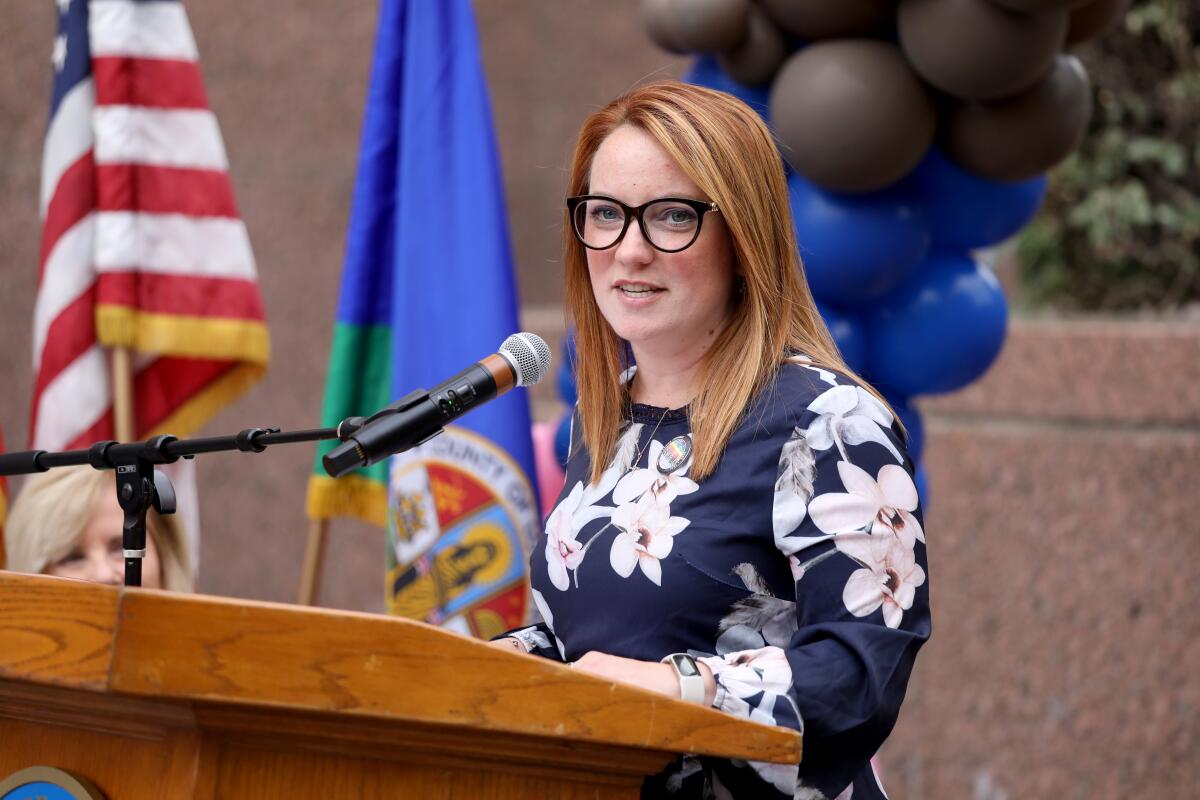Editorial: L.A. County shows L.A. city that reform doesn’t have to be hard

Let’s compare how the city and county of Los Angeles have handled government reform recently.
In less than a week, county Supervisors Lindsey Horvath and Janice Hahn unveiled a sweeping plan to expand their board from five members to nine, add an independently elected county executive and create a new ethics commission to investigate government misconduct — and the Board of Supervisors agreed to move forward with putting the changes on the November ballot.
In a few months, voters could overhaul L.A. County’s notoriously bureaucratic and dysfunctional government and make it more responsive to residents.
It’s taking far too long to get a report on how to improve Los Angeles County government. It’s time to go to the ballot and let voters decide.
Over at Los Angeles City Hall, more than a year and a half has passed since City Council members vowed to make sweeping changes to governance after the latest scandal. But they’ve only put a couple of reforms on the November ballot, postponing the more important changes, such as expanding the size of the council.
Voters in November will be asked to approve an independent redistricting commission, similar to what the state and county already have, so City Council members can’t draw their own districts. They’ll also get a watered-down version of ethics reforms that fall short of what experts and academics recommend.
The City Council’s decision to eliminate key changes to strengthen the Ethics Commission proves, yet again, that City Hall insiders are incapable of making meaningful reforms.
More ambitious changes, including a proposal to expand the City Council, were punted to a charter reform commission. The commission will make recommendations on the size and powers of future councils, among other governance changes. But the City Council will decide which — if any — proposals make it to the 2026 ballot.
While City Council members dithered over the details, wrung their hands over the ideal number of council districts and seized any uncertainty as an excuse to delay changes that could limit their power, county leaders forged ahead, choosing progress over perfection.
The reason for such different approaches? Strong leadership.
Los Angeles City Hall has been rocked by scandal after scandal, but now there’s momentum to reform city government.
Horvath, who is the newest member of the Board of Supervisors, said from the get-go that she was going to change county government. Her fellow supervisors requested a report on possible reforms a year and a half ago, but the study hasn’t even begun. Frustrated with the slow progress, Horvath and Hahn pulled together a package of reforms that have been studied and discussed for decades, many of which had previously been backed by other members of the board.
There wasn’t unanimity among the board about the particulars of the proposal and the rush to get it on the November ballot. Supervisors Holly Mitchell and Kathryn Barger abstained from voting Tuesday on the motion to have county lawyers draft the ballot language. But Horvath, Hahn and Supervisor Hilda Solis said they didn’t want to miss the rare moment when there is public support for change, and a county charter commission would hammer out specific details later.
The City Council is slow-walking governance reform proposals, which means charter changes to allow a larger council and ethics reforms may not get on the November ballot.
At the city, Council President Paul Krekorian had led the reform committee through detailed — sometimes excruciatingly so — discussions to try and reach consensus. Even though Krekorian said he wanted to get council expansion on the November ballot, he didn’t push his colleagues to be decisive. City voters have to wait for more comprehensive changes.
It’s a shame because the interest in reform may wane after this election. Calls for changes to city governance began in October 2022, when a leaked audio recording captured three council members making deplorable and racially divisive comments about their colleagues and constituents as they plotted for political power.
The incident renewed concerns about the city’s 2021 botched redistricting process. In response to the public outrage, the council created an ad hoc committee on governance reform and held public hearings across the city last year. A panel of academics funded by philanthropic groups recommended a series of reforms, including expanding the City Council, which hasn’t changed in size since 1924, although the population has nearly quadrupled.
While the attention has been focused on fixing City Hall, the county has been in dire need of reform too. L.A. County adopted its current charter in 1912, when the population was just 500,000 and before women could vote. It’s a government representing 10 million people with no elected executive to run it, just the oversight of five supervisors, each representing a district of about 2 million people.
City and county voters have rejected previous proposals to expand the City Council and the Board of Supervisors. But recent polling suggests voters are ready to support changing the structure of local government, even if it means hiring more politicians. Kudos to the Board of Supervisors for seizing the moment and moving forward with a major government overhaul proposal — and showing city leaders that while reform is complex, it doesn’t have to be hard.
More to Read
A cure for the common opinion
Get thought-provoking perspectives with our weekly newsletter.
You may occasionally receive promotional content from the Los Angeles Times.














